Related Research Articles

Suspense is a radio drama series broadcast on CBS Radio from 1940 through 1962.
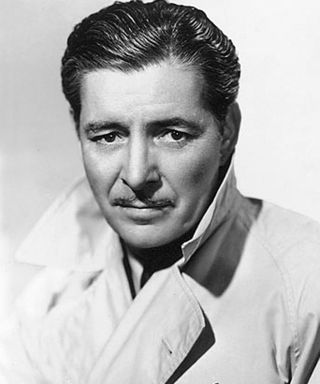
Ronald Charles Colman was an English-born actor, starting his career in theatre and silent film in his native country, then emigrating to the United States where he had a highly successful Hollywood film career. He starred in silent films and successfully transitioned to sound, aided by a distinctive, pleasing voice. He was most popular during the 1920s, 1930s and 1940s. He received Oscar nominations for Bulldog Drummond (1929), Condemned (1929) and Random Harvest (1942). Colman starred in several classic films, including A Tale of Two Cities (1935), Lost Horizon (1937) and The Prisoner of Zenda (1937). He also played the starring role in the Technicolor classic Kismet (1944), with Marlene Dietrich, which was nominated for four Academy Awards. In 1947, he won an Academy Award for Best Actor and Golden Globe Award for Best Actor for the film A Double Life.

Night Must Fall is a play, a psychological thriller, by Emlyn Williams, first performed in 1935. There have been three filmed adaptations: Night Must Fall (1937); a 1954 adaptation on the television anthology series Ponds Theater starring Terry Kilburn, Una O'Connor, and Evelyn Varden; and Night Must Fall (1964).

Walter Davis Pidgeon was a Canadian-American actor. A major leading man during the Golden Age of Hollywood, known for his "portrayals of men who prove both sturdy and wise," Pidgeon earned two Academy Award nominations for Best Actor, for his roles in Mrs. Miniver (1942) and Madame Curie (1943).

Joan de Beauvoir de Havilland, known professionally as Joan Fontaine, was an English-American actress who is best known for her starring roles in Hollywood films during the Golden Age of Hollywood. Fontaine appeared in more than 45 films in a career that spanned five decades. She was the younger sister of actress Olivia de Havilland. Their rivalry was well-documented in the media at the height of Fontaine's career.

Dorothy Hackett McGuire was an American actress. She was nominated for the Academy Award for Best Actress for Gentleman's Agreement (1947) and won the National Board of Review Award for Best Actress for Friendly Persuasion (1956). She starred as the mother in the popular films Old Yeller (1957) and Swiss Family Robinson (1960).

Douglas Elton Fairbanks Jr. was an American actor, producer, and decorated naval officer of World War II. He is best-known for starring in such films as The Prisoner of Zenda (1937), Gunga Din (1939), and The Corsican Brothers (1941). He was the son of Douglas Fairbanks and the stepson of Mary Pickford, and his first marriage was to actress Joan Crawford.

Oliver Burgess Meredith was an American actor and filmmaker whose career encompassed radio, theater, film, and television.

The Great McGinty is a 1940 American political satire comedy film written and directed by Preston Sturges, starring Brian Donlevy and Akim Tamiroff and featuring William Demarest and Muriel Angelus. It was Sturges's first film as a director; he sold the story to Paramount Pictures for just $10 on condition he direct the film. Sturges received an Oscar for Best Original Screenplay.

The Devil and Miss Jones is a 1941 American comedy film directed by Sam Wood and starring Jean Arthur, Robert Cummings, and Charles Coburn. Its plot follows a department store tycoon who goes undercover in one of his Manhattan shops to ferret union organizers, but instead becomes involved in the employees' personal lives.

Ann Marie Blyth is an American retired actress and singer. For her performance as Veda in the 1945 Michael Curtiz film Mildred Pierce, Blyth was nominated for an Academy Award for Best Supporting Actress. She is one of the last surviving stars from the Golden Age of Hollywood cinema, and became the earliest living acting Academy Award nominee upon the death of Angela Lansbury in 2022.
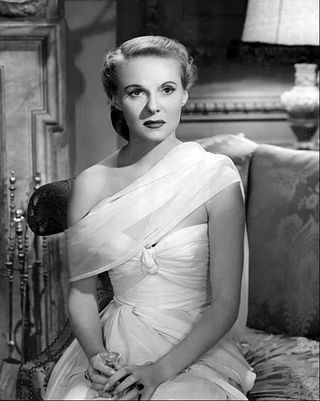
Dorothy Ann Todd was an English film, television and stage actress who achieved international fame when she starred in The Seventh Veil (1945). From 1949 to 1957 she was married to David Lean who directed her in The Passionate Friends (1949), Madeleine (1950), and The Sound Barrier (1952). She was a member of The Old Vic theatre company and in 1957 starred in a Broadway play. In her later years she wrote, produced and directed travel documentaries.
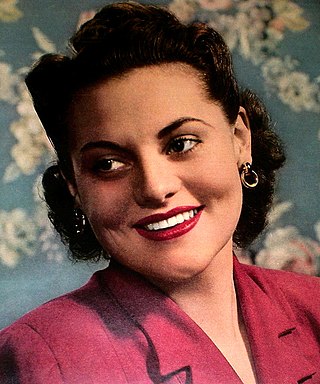
Jeanne Carolyn Cagney was an American film, stage, and television actress.

Rita Ann Johnson was an American actress.

John Lund was an American film, stage, and radio actor who is probably best remembered for his role in the film A Foreign Affair (1948) and a dual role in To Each His Own (1946).
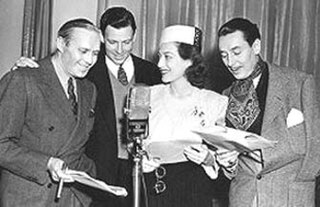
The Screen Guild Theater is a radio anthology series broadcast from 1939 until 1952 during the Golden Age of Radio. Leading Hollywood stars performed adaptations of popular motion pictures. Originating on CBS Radio, it aired under several different titles including The Gulf Screen Guild Show, The Gulf Screen Guild Theater, The Lady Esther Screen Guild Theater and The Camel Screen Guild Players. Fees that would ordinarily have been paid to the stars and studios were instead donated to the Motion Picture Relief Fund, and were used for the construction and maintenance of the Motion Picture Country House.

No Time for Comedy is a 1940 American comedy-drama film based on the play of the same name by S. N. Behrman, starring James Stewart, Rosalind Russell, Genevieve Tobin and Charlie Ruggles.

Elspeth Thexton Eric was an American actress in old-time radio, "usually cast as the other woman in soaps and serials".

The Ginger Rogers filmography lists the film appearances of American actress Ginger Rogers, as well as her television, stage, and radio credits. Rogers's career spanned fifty-seven years, from 1930 to 1987.
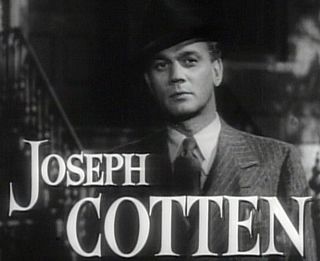
Joseph Cotten was an American actor known for his roles on stage and screen. Cotten's most notable projects include his collaborations with Orson Welles. He portrayed Jed Leland in Citizen Kane (1941), Eugene Morgan in The Magnificent Ambersons (1942), and Howard Graham in Journey into Fear (1943). He continued to act alongside Welles in films such as The Third Man (1949), Othello (1951), Touch of Evil (1958), and F for Fake (1973),
References
- ↑ "James Barrie - Echoes of the War". Classic Literature Library.
- ↑ Kirby, Walter (3 February 1952). "Better Radio Programs for the Week". The Decatur Daily Review. The Decatur Daily Review. p. 40. Retrieved 3 June 2015– via Newspapers.com.

- ↑ "E. & L. Barrymore With Fairbanks, Jr., Star on Screen Guild Players". Harrisburg Telegraph. Harrisburg Telegraph. 5 October 1946. p. 17. Retrieved 2 October 2015– via Newspapers.com.
